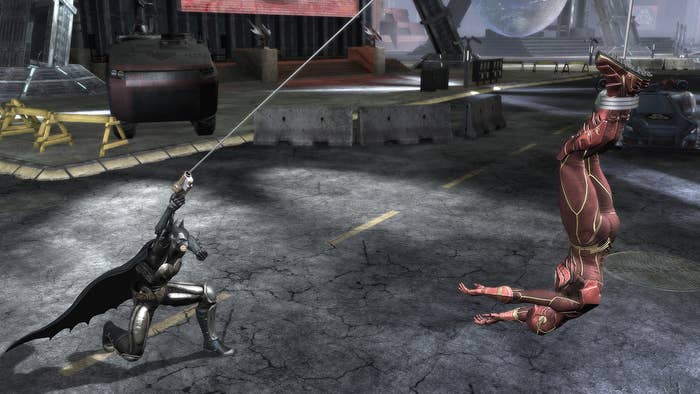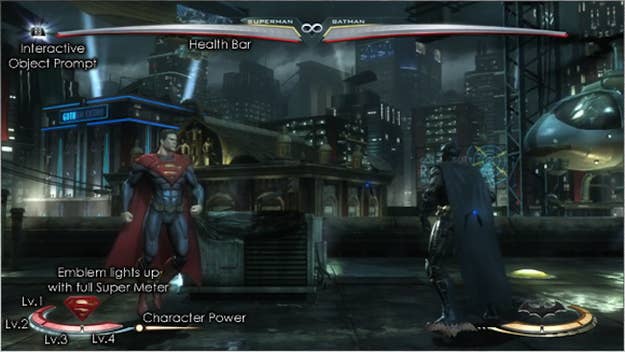
In 2013, the traditional fighting game — you know the one, with two close-quarters champions duking it out underneath shrinking health bars — is commercially and culturally irrelevant. The former is as surprising as it is indisputable. There was not a single traditional fighting game among the top 100 best-selling video games of 2012 (although the wrestling game WWE '13 came in at #97); in 2011 and 2010 there were only two apiece (the highest ranking of which was a Mortal Kombat reboot at #55). To get a sense of the latter, imagine how unthinkable it would be today for a fighting game to make the news, as the original Mortal Kombat did for its violence back in 1992. The nicest adjective you can use for these games is "quaint."
Quaint: Even the genre's major commercial successes in the past half decade, Street Fighter IV and Super Smash Brothers Brawl, are both nostalgia trips to decades-old classics. And worse: Fighting games are home to some of gaming's most hateful depictions of women, as the tragic persistence of the Dead of Alive series makes clear. They still enjoy an influence in the gaming world that is totally disproportionate to their importance, for two reasons, as far as I can tell: 1. Their esteem in the competitive gaming world and 2. Their historical position as one of gaming's "big" genres. But somehow, these games have become relics.
What happened? In the early part of the last decade, a generation of terrific action titles (God of War, Ninja Gaiden, Devil May Cry) took the best thing about fighting games, their mechanical depth, and applied it to strong single-player narratives. Compared to these groundbreakers, traditional fighting games seemed, well, gamey. The basic tropes of the fighting game — the Brady Bunch–window character selection screen, followed by a best-two-out-of-three bout — have remained basically unchanged since their popularization in the arcades of the 1980s. It's hard to justify a $50 or $60 purchase in 2013 when a game made in 1993 or 2003 does the same thing just as well. I also suspect that the rise of online multiplayer, and the decline of local, had a role here as well. It's just not quite as fun to pummel and be pummeled by a 16-year-old in Sheboygan or Seoul as it is by your best friend sitting on the sofa right next to you.
And it's significant that fighting games have been largely left out of the two current revolutions in gaming: mobile and indie. Traditional fighting games don't work on touchscreens and seem not to interest the brighter minds in the indie world, with the exception of Bennett Foddy. Not only is the fighting game floundering, no one seems to be trying to rescue it.

So the sight of a major television campaign for a new fighting game, like the current one for Injustice: Gods Among Us, is curious. True, the game is set in the endlessly profitable DC Comics "universe," meaning it affords players the irresistible opportunity to run over Superman with the Batmobile (and more resistible, the opportunity to hear the Green Arrow threaten to "shoot an arrow" up Wonder Woman's "ass"), all in definition so high that Aquaman appears to have been glazed and fired in a kiln. And it is made by NetherRealm, the studio behind that well-regarded Kombat reboot. So does this would-be blockbuster represent a modernization of the genre, an entrance into a new decade?
No. In fact, if you haven't played a fighting game since the late '90s/early 2000s heyday of Tekken and Soul Calibur and Marvel vs. Capcom, you may be shocked by just how little the genre has changed. That's not to say that Injustice is a bad game — in fact it's a very enjoyable one — just that the actual experience of playing it, aesthetics and licences aside, is indistinguishable from games that have been out for decades. Like, as you can see from the screenshot above, there is an actual thing in the game called the "Interactive Object Prompt"! And that's the first thing that Warner Bros. touts on their fact sheet about the game! I'm pretty sure that the entire history of video games is based on the idea of "interactive object prompts" and that we basically take them for granted at this point. Like, in the sense that I am supposed to write about the new and novel in gaming, my job compels me to stop writing about the experience of playing Injustice immediately.
The best thing about Injustice, by far, is its story, which is probably the single most brazen abuse of a comic book license I have ever experienced, and I mean that as a compliment. In short: The Joker has tricked Superman into murdering Lois Lane and his unborn child and then blown up Metropolis with a nuclear bomb. Superman, mad with grief, has instituted an authoritarian world government run by superheroes, and it's up to Batman and a scrappy resistance to bring him down. Also, it takes place in twin dimensions, so there are two of every character. Also, what the fuck? Even I, who have absolutely no interest in comics or the preservation of their canon, felt pangs of impropriety rooting for a suddenly good Lex Luthor against a megalomaniacal Superman. It feels like the Joker tricked NeverRealm into writing this script, and thank goodness for that.
If only a developer would approach the mechanics of a fighter with a fraction of the wit and creativity of Injustice's writers, we'd have a game worth talking about. At the Game Developer's Conference last month, at Sony's indie showcase, I played a game called Divekick (which, according to the game's developers, Iron Galaxy, started as a joke). It looks like a traditional fighting game, and it's an affectionate parody of the old fighters. But there are only two buttons, one to jump, and one to kick, and a single hit ends the fight. You play it locally, as I did, literally holding one end of a Vita while my opponent held the other. I'd never played anything like it before. I wanted to tell my friends about it. When was the last time a fighting game made you say that?

